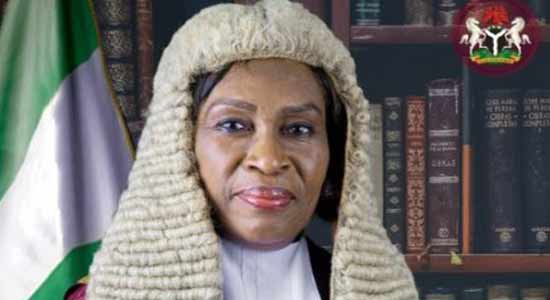Retired Justice of the Court of Appeal, Justice Oludotun Adefope-Okojie, has issued a strong rebuke of tribalism and mediocrity in public service, calling for a return to merit-based appointments as the only way to reposition Nigeria for true progress.
Speaking at the official unveiling of the 4th edition of her book, “Civil Litigation: A Quick Reference Guide to Substantive Law and Procedure”, held in Abuja, the former appellate court judge warned that Nigeria is crumbling under political, ethnic, and religious divisions. She added that Nigeria can no longer afford to ignore the consequences.
“We cannot continue with the patronage of mediocrity if we are to move forward.
“We must move away from tribal politics and sectional favouritism, especially when we have many sound and brilliant minds in this country,” she said.
Justice Adefope-Okojie described it as deeply offensive when national discourse is framed along regional lines, questioning why leaders continue to prioritise ethnic identities over the collective interest of the nation.
“It is always offensive to me when I hear, ‘This is the position of the North,’ or ‘This is the position of the East or Southwest.’ What is the position of Nigeria? Who is thinking of this country?” She warned that if Nigerians cannot find a common ground for unity, the nation may have to consider more difficult conversations about its future.
“If we are not ready to move together as one, maybe we should break up. If we don’t want to break up, then we must merge. Forget where you are from.”
Turning her attention to the judiciary, Justice Adefope-Okojie described the system as “almost comatose,” lamenting the growing backlog of cases and waning public confidence in the courts.
“The people have lost interest in the courts. The backlogs are too many. We are repelling investors. Nobody will invest in a country where disputes take forever to resolve.”
She acknowledged the hard work and integrity of many judges but said they are trapped in a system overwhelmed by excessive litigation, political interference, and a lack of internal democracy within political parties.
“Every single case goes to court and ends up at the apex court. It cannot work. Nigeria is too litigious.”According to her, flawed party primaries and arbitrary candidate substitutions flood the courts with avoidable election disputes, further straining the judicial system.
While acknowledging that corruption remains a serious temptation within the judiciary, she urged judges to rise above it for the sake of the nation’s survival.
“Any judge who wants to be a multi-billionaire can do it easily. But if we’re going to help this country, we have to stand firm.” Reflecting on her life and long years of service, Justice Adefope-Okojie described herself as a privileged elder with nothing to lose and everything to say.
“This is a time for elders to talk. I’m not looking for money. God has blessed me. So, I must speak the truth.” She expressed hope in Nigeria’s divine purpose, stating that the country’s endurance amid challenges is nothing short of a miracle.
“Everything has increased in this country, and we are still moving. I believe this is a nation set aside by God for something. And I pray that it will happen before my eyes.
“There has to be a change. What is the problem with letting the best people shine? The nation is going through a lot. There is so much division. The truth must be told. We have to come back to the truth,” she said.
The Attorney General of the Federation and Minister of Justice, Lateef Fagbemi (SAN), praised the author’s contribution to legal scholarship, describing her book as a valuable addition to Nigeria’s legal literature.
Represented by Tijjani Gazali, the director of civil litigation at the federal ministry of justice, Fagbemi said: “This book will surely fill a gap in our legal system, particularly in the area of civil litigation,” he said. He encouraged other jurists to emulate her by writing and publishing works that support legal development and judicial reform.
Former Vice President, Prof Yemi Osinbajo, and the Emir of Kano, Dr Muhammadu Sanusi II, served as Special Guests of Honour at the event.
Both men lauded Justice Adefope-Okojie for her diligence and commitment to legal excellence, describing her book as a culmination of decades of experience on the bench.
The book was formally reviewed by Isaiah Bozimo (SAN), who commended its clarity, practical relevance, and alignment with both procedural and substantive aspects of civil litigation. A retired Justice of the Supreme Court, Justice Amina Augie served as chairperson of the occasion.

